What holds a room together when the palette leans pale and the shapes are simple? Scandinavian decor begins with that premise, but then it builds upon it room by room. Let’s trace how those choices take shape across Nordic-style interiors, and what you can pick to achieve great results via a shortcut.
What Defines Modern Scandinavian Decor Style?
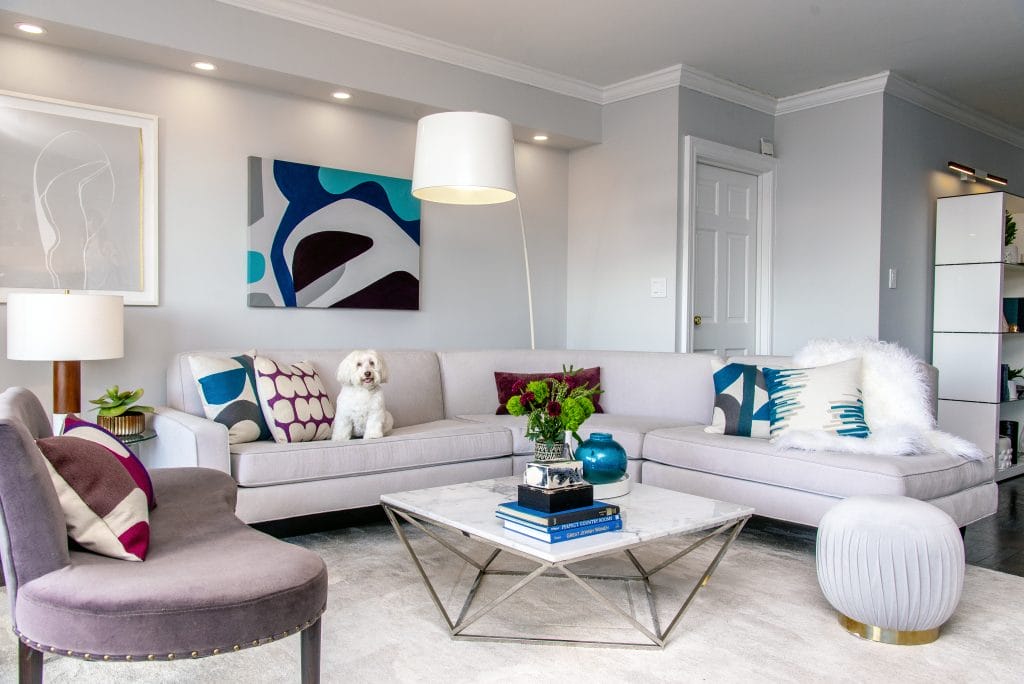
Scandinavian home decor style strikes a near-perfect balance between comfort and minimalism—both hallmarks of Scandinavian design. As one of the interior design styles that shaped (and grew with) the 20th century, some of its features also resemble modernism.
But before all that, Scandinavian interior design begins in homes built to carry Nordic people through long, dim seasons. You see it in how the light is treated, or in the abundance of pale wood, which isn’t just a visual choice. Even Scandinavian wall decor is specific. The layout logic prevents the space from absorbing too much shadow, as too many objects dull the light’s movement.
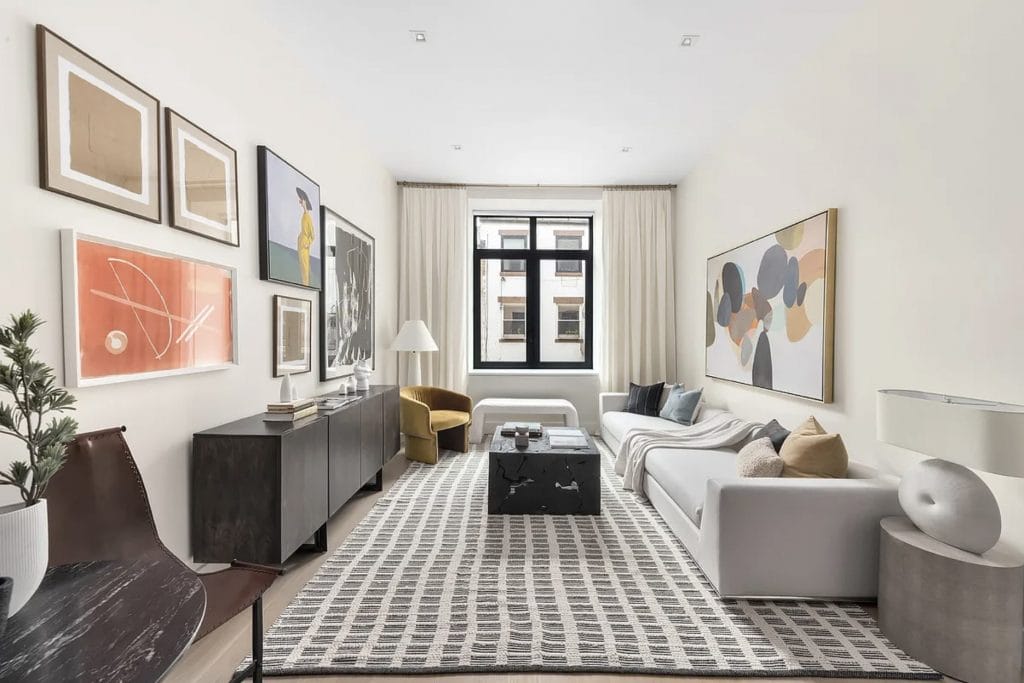
The concept of Hygge might be what sets Scandinavian home decor apart from other styles the most. That is, to create a cozy environment that encourages feelings of contentment. Although the word comes from Denmark, many Nordic homes share the same comforting essence.
Not sure if Scandinavian decor style is right for you? Take our Free Interior Design Style Quiz to help discover your unique decorating style today!
The Best Scandinavian Decor Ideas
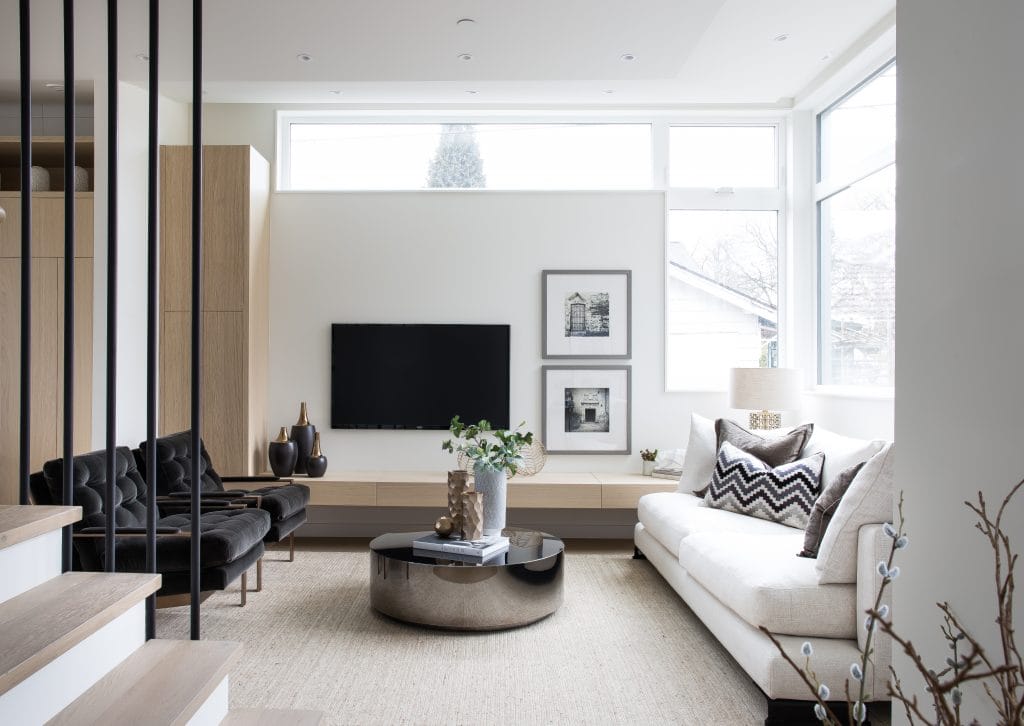
Scandinavian house decor incorporates just the right amount of elements– no more, no less. The same applies to Scandi color schemes, typically calming and neutral with accents popping up in measured doses.
Scandinavian Style Living Room Decor
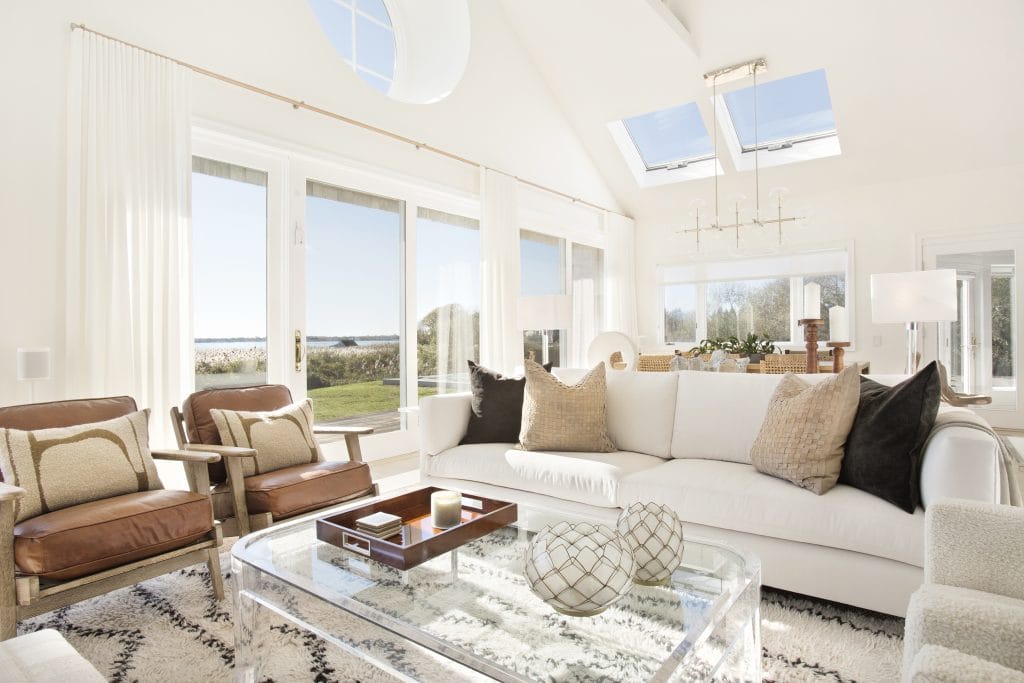
A Scandinavian living room, although minimal, is very inviting with its balanced blend of hard and soft elements. The key to designing a harmonious environment here is striking a balance between accessories, furniture, and empty space.
1. Seating That Establishes the Room’s Use
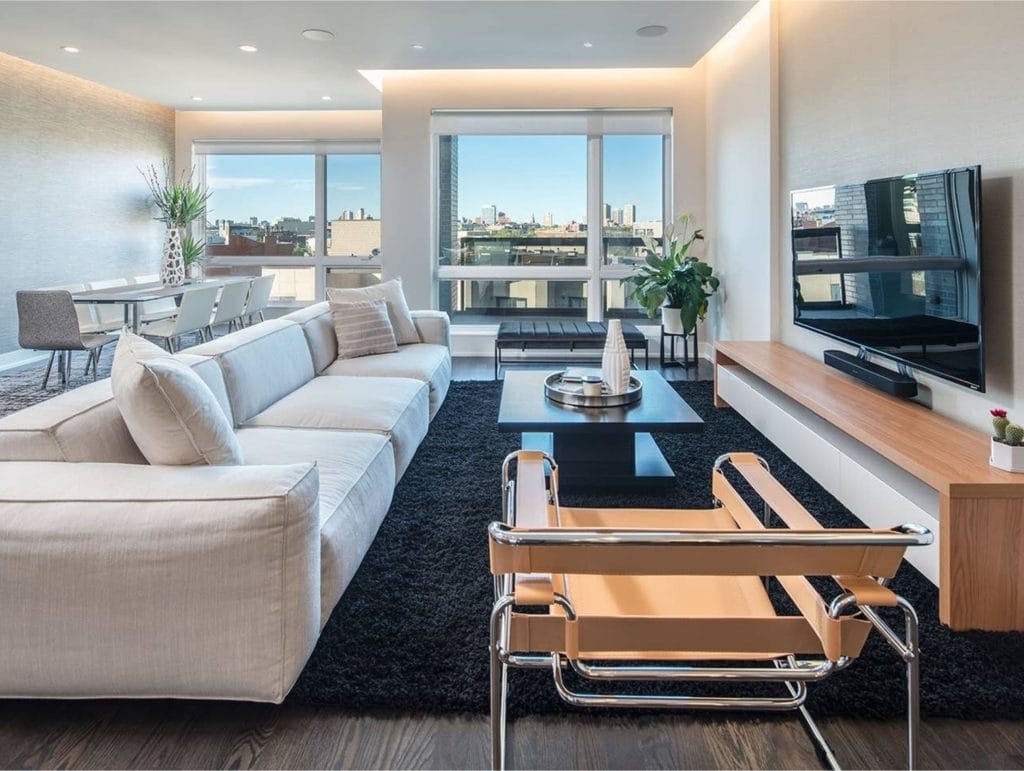
Are you decorating a Scandinavian living room from scratch? Use the sofa to set the primary orientation of the layout. If the frame elements are visible, they should carry a pale wood—most often birch or ash—with visible grain and squared joints. Keep the height low to match the line of the window sill or the nearest table surface.
Pro Tip: When selecting seating in a Scandinavian decor style, measure how much space the legs leave open. That clearance often matters more than the upholstery.
Our Picks
2. Lighting For the Shortest Days
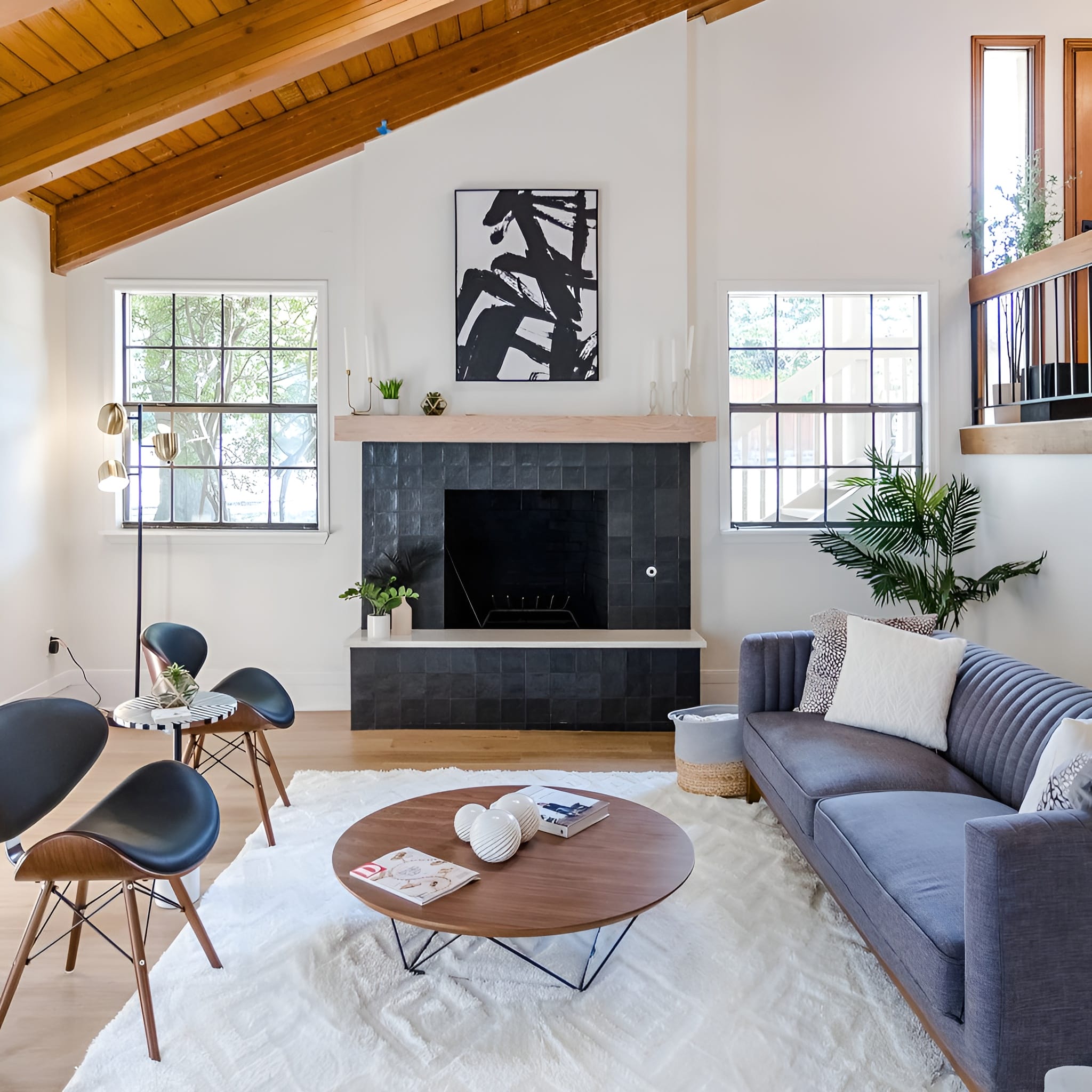
In a Scandinavian living room, you will often find a floor lamp set behind the sofa or next to a reading chair. The most recognizable designs use a narrow stem in powder-coated steel or brushed brass, or a wooden tripod topped by a dome or cone shade. Table lamps typically feature glazed stoneware or turned wood bases paired with linen shades, designed to sit comfortably on low cabinets or side tables.
Pro Tip: In Scandinavian decor style, lamps are treated as furniture. Choose pieces that match the material language of the room and stay within the same tonal range as nearby objects.
Our Picks
3. Rugs Do Not Only Ground the Floor
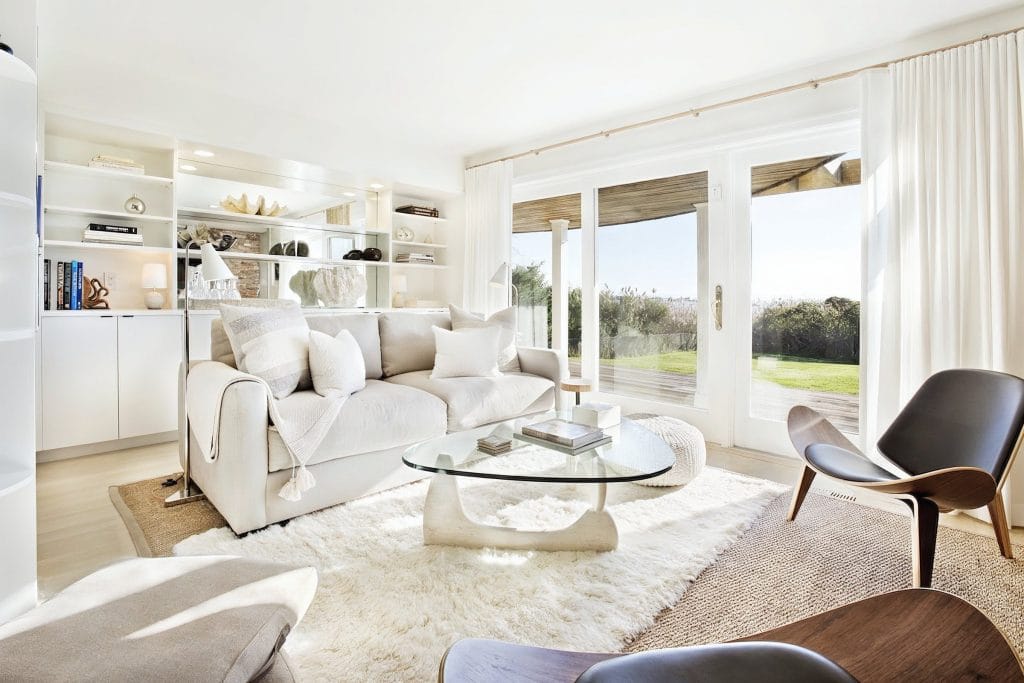
A rug in a Scandinavian living room sits directly under the parts of the room that carry the most use. With that in mind, material and quality matter more than pattern here. Look for flatweave in wool or jute to keep the surface even and stable, especially under chairs with narrow legs or sofas with low frames. The edge of the rug should fall short of the walls to let light reach the floor, which helps the room stay open and legible.
Pro Tip: A rug in Scandinavian decor style should connect the furniture and define the zone.
Our Picks
Scandinavian Dining Room Decor
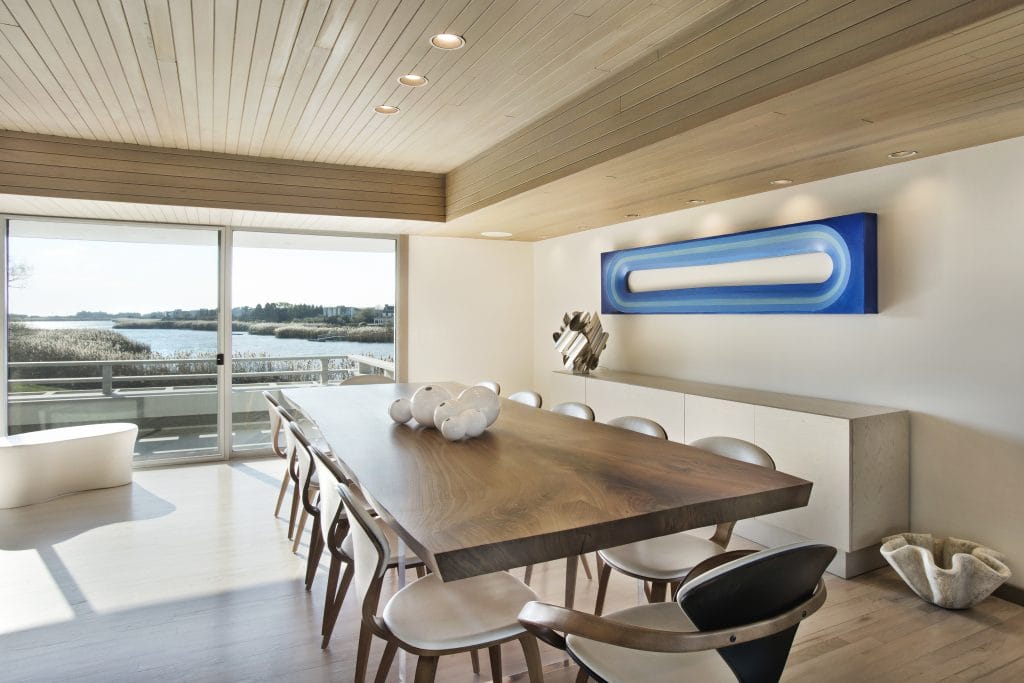
The dining room in a Scandinavian home sits close to the kitchen and follows the same material rhythm. Light wood carries across both spaces, and the layout stays open enough to move between preparation and gathering.
4. A Pendant That Speaks
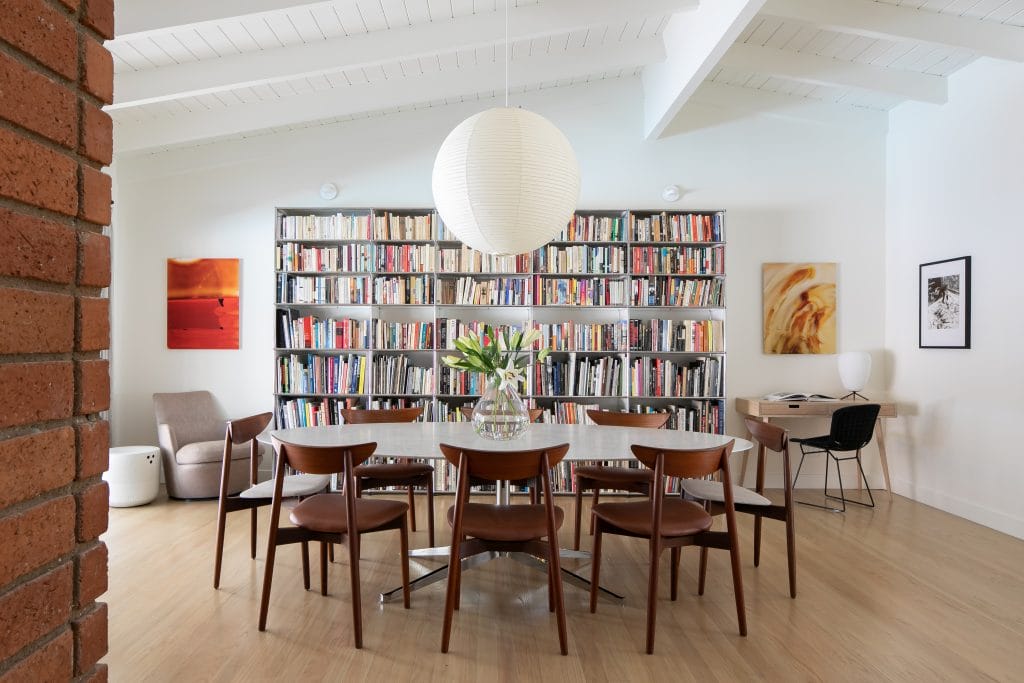
Scandinavian dining rooms often feature a single pendant with enough visual weight to anchor the center. Dome-shaped shades in coated metal work best with open-backed chairs and bare wood tables. For a softer presence, linen-covered pendants or woven forms sit well over cloth or textured runners. Its color usually repeats something already in the room, pulled from nearby frames or ceramics.
Pro Tip: The fixture doesn’t need to match the table, but it should settle into the same register.
Our Picks
5. Set the Surface With a Runner or Symmetrical Placemats
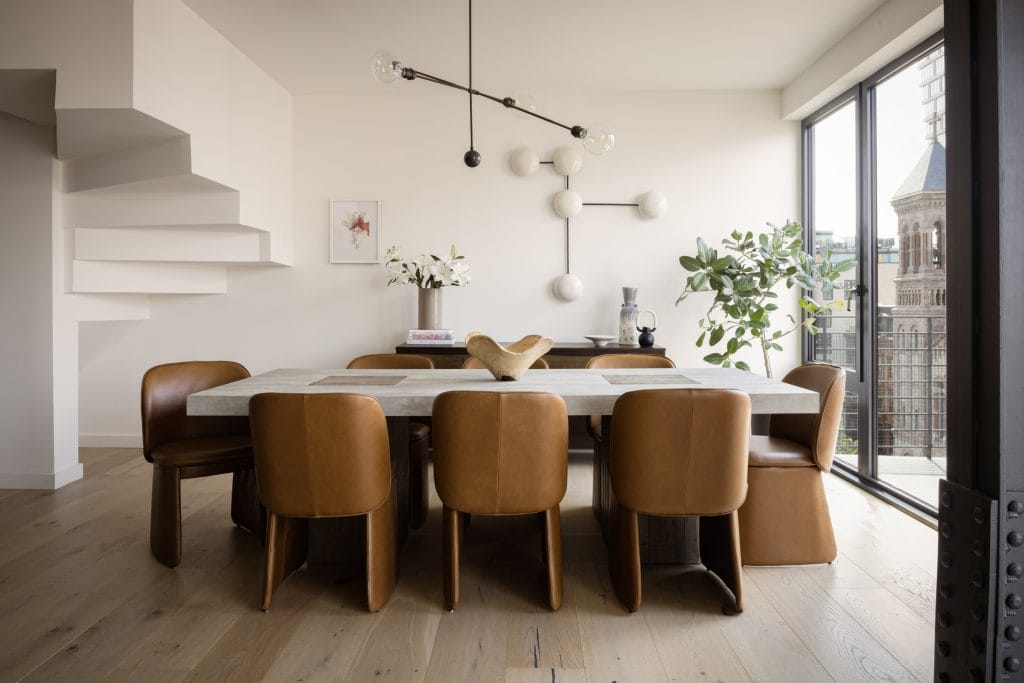
Linen runners appear frequently on Scandinavian tables, especially when the surface underneath is pale or heavily grained. Choose midweight fabric in slate, moss, or unbleached tones that complement unfinished wood and matte ceramics. Moreover, a runner with a stitched edge might sit better than one with fringe, especially when paired with stoneware or glass that shows its outline.
Pro Tip: The runner can echo the light fixtures in tone or shift to pick up something from nearby chairs.
Our Picks
6. Wall & Table Decor in Scandi Style
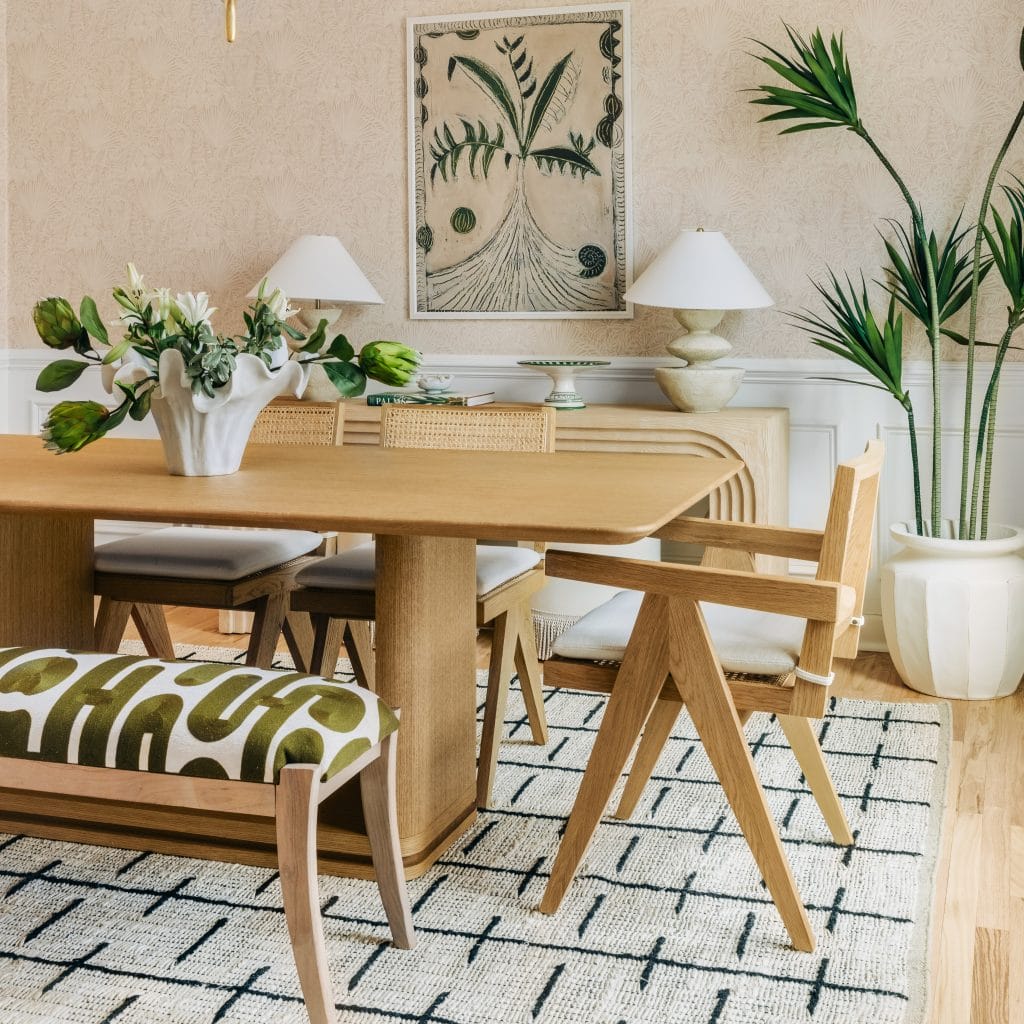
When it comes to wall art, a single element placed with care can settle the whole room. Whether it’s a line drawing or an abstract watercolor, Scandinavian wall decor often depicts or alludes to nature or the human form. Other typical decorative items include glazed ceramics, turned wood vessels, low glass shapes, candles, and minimalistic sculptural objects. Most sit in pairs or alone, placed off-center or toward one end of the table.
Pro Tip: The Glass surface in front of a wall art piece reflects light from the pendants, which can help illuminate a small or dark room.
Our Picks
Scandinavian Home Decor & Design in the Kitchen
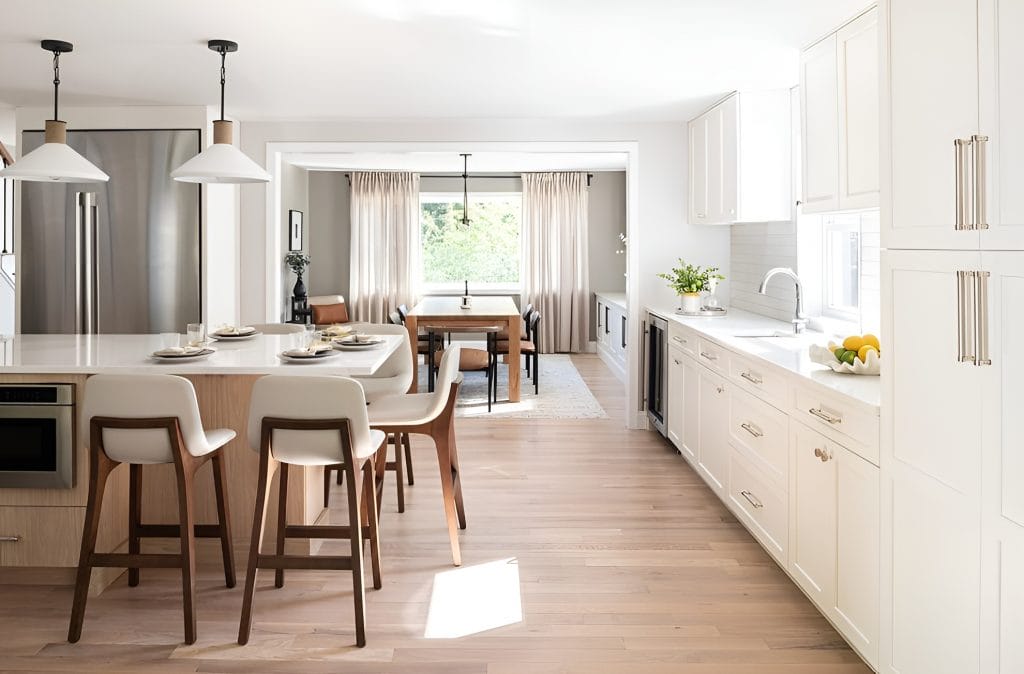
Scandinavian kitchen design follows the use throughout the course of a day. Exposed storage where motion repeats, such as open floating shelving, is one of its most notable features. In addition, surfaces hold fewer objects but carry more function.
7. Open Shelving in Natural Finish
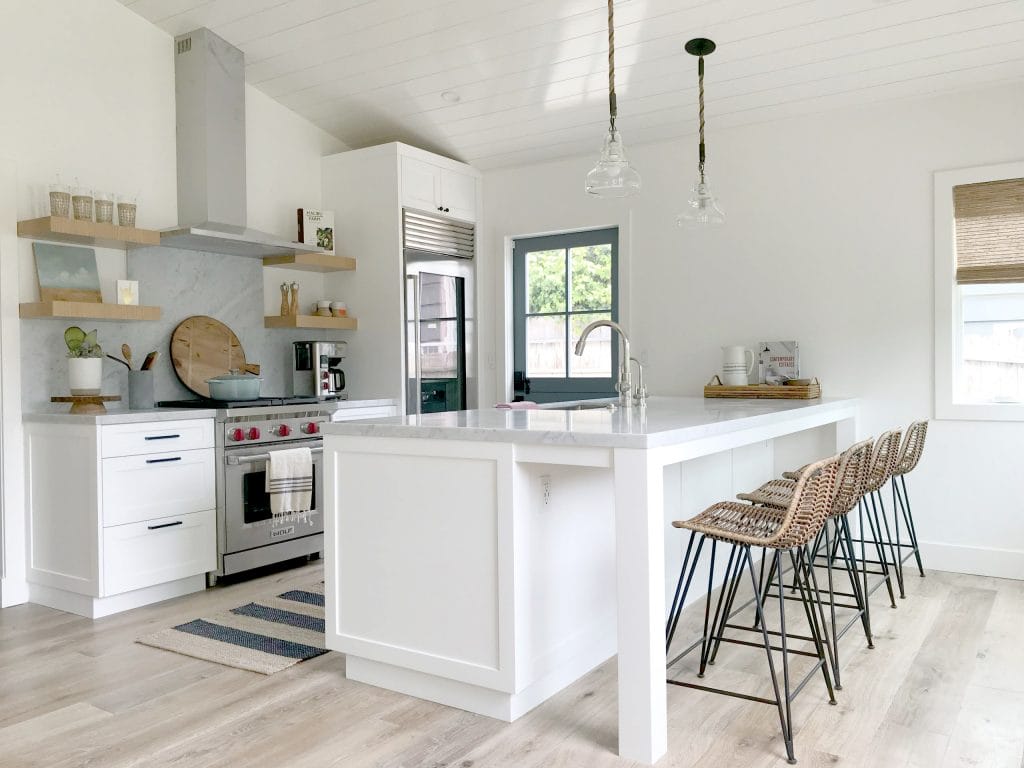
Shelving in a Scandinavian kitchen should carry only what cycles through each day. Consider arranging plates at the center, stacked in full view, with glasses standing in rows beside them. The shelf itself should be made from pale wood with visible grain, sealed to resist steam from the sink or stove. Keep the front edge clean and the back from collecting unused items.
Pro Tip: Install shelving near prep zones to keep movement concentrated.
Our Picks
8. Wood and Fiber Stools
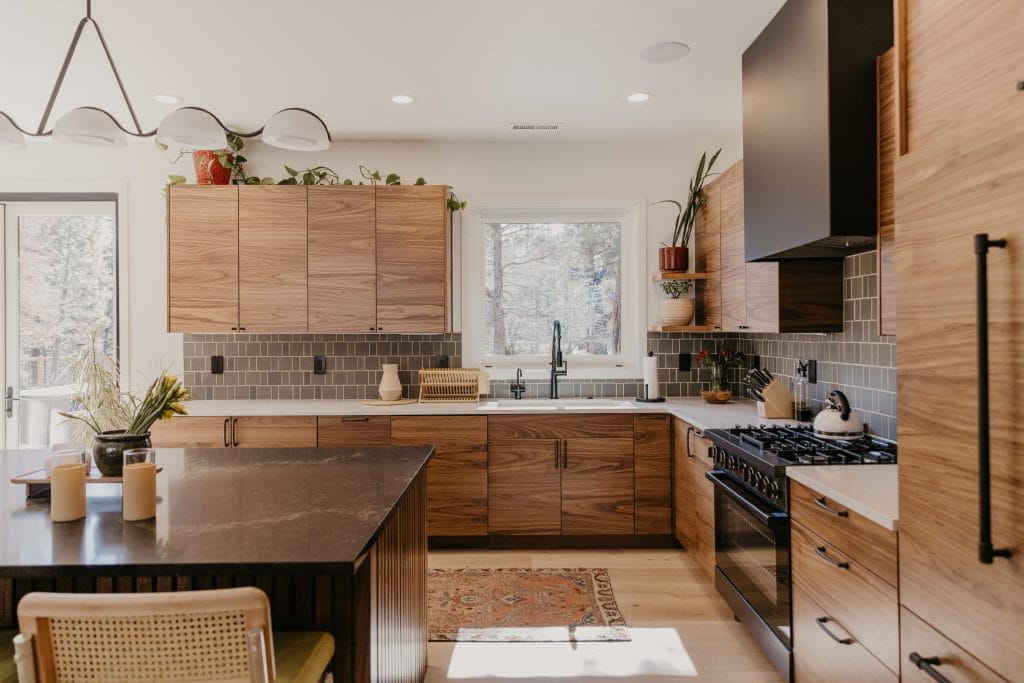
Select counter-height stools with natural wood legs and woven or textile seats. In Scandinavian decor style, they should match the wood tone of nearby cabinets or shelving. Typical materials include beech, ash, soaped oak, sometimes painted black for accent. Legs are wide and exposed, spaced to avoid collision with drawers or supports underneath the counter.
Pro Tip: Choose stools that stay quiet under the counter.
Our Picks
9. Styled Practical Vignettes
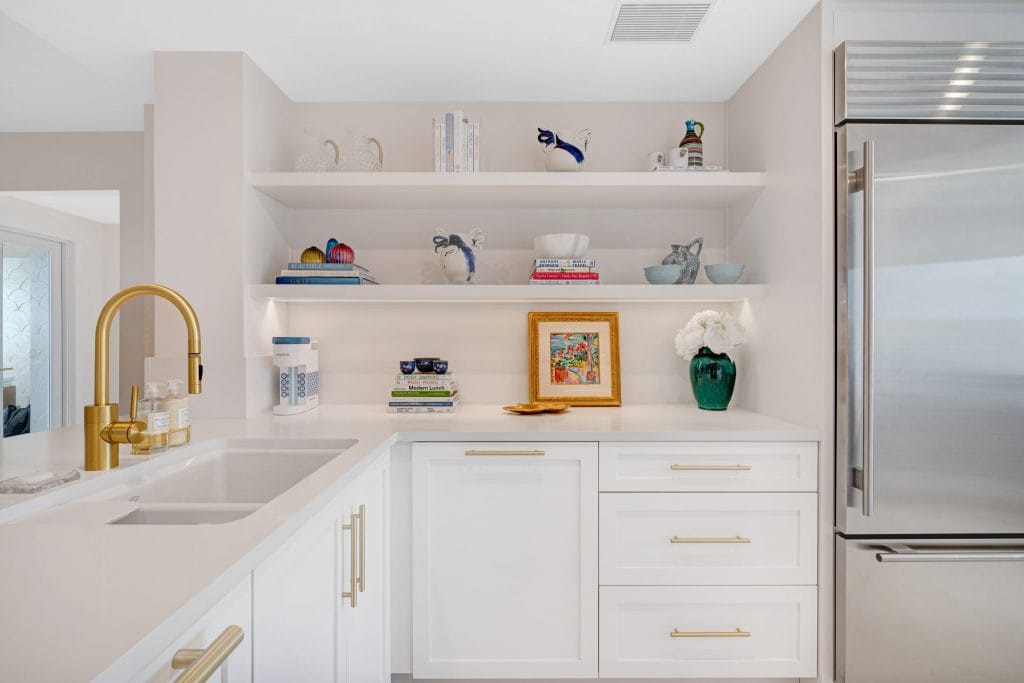
Use the corners and ends of counters to hold daily objects that don’t belong to a fixed station, but make those functional features a part of the decor. A ceramic bowl, a stoneware pourer, even a folded linen cloth can soften the hard edge of the surface. Find the layout that works for you and arrange loose groups that reflect how often they’re handled. The material choices should echo the rest of the room: unglazed or matte finishes, and pale tones unless you go for decorative accents.
Pro Tip: The outer third of the counter is where hands reach during prep, but the decor doesn’t stand in the way.
Our Picks
Scandinavian Bedroom Decor Ideas
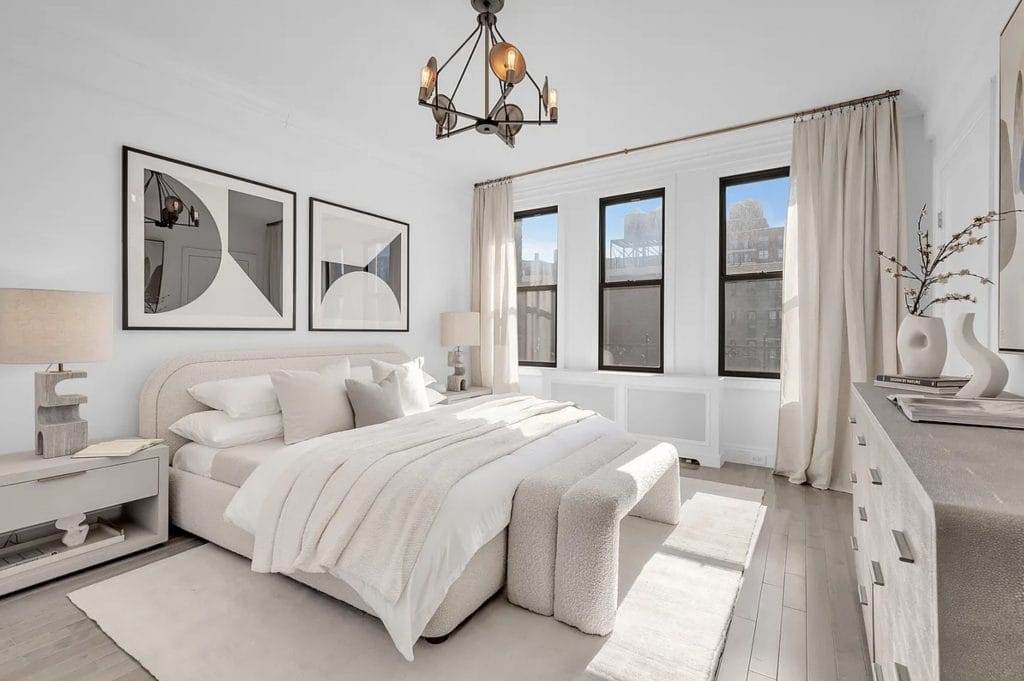
Scandinavian bedroom design follows the same spatial discipline found in the rest of the home. The layout holds open floor along at least one full side of the bed, while walls carry minimal weight, often limited to a lamp or a shelf. Here are some specific ideas you could use.
10. The Bed Sets the Room’s Scale
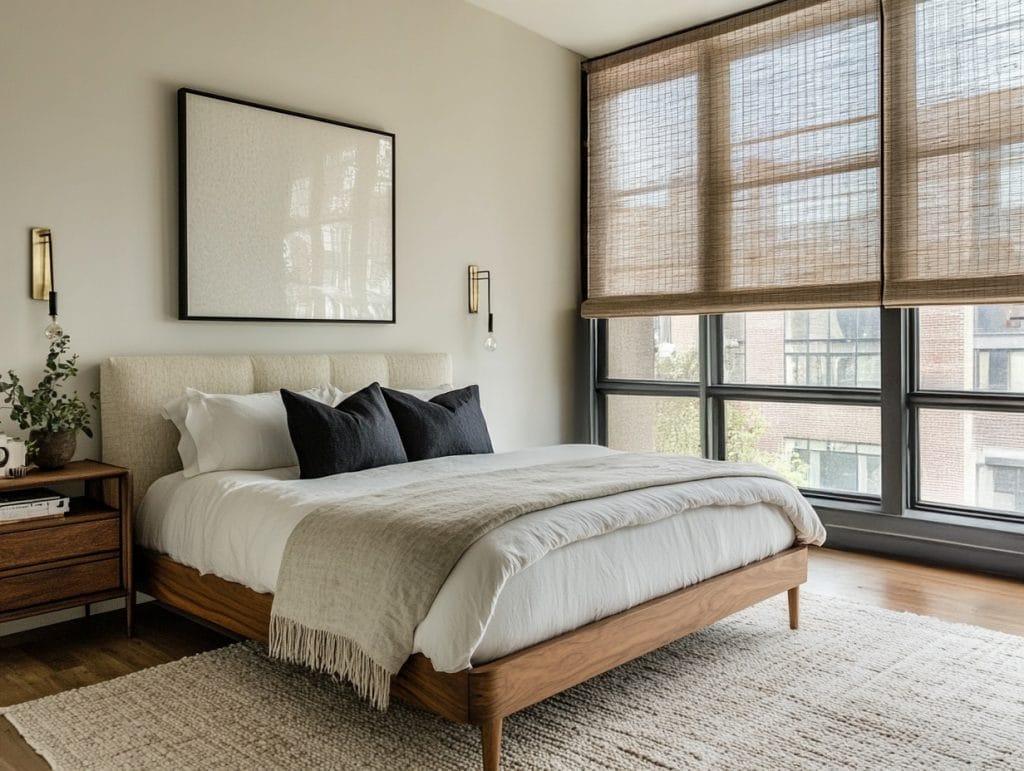
In a typical Nordic bedroom, the solid pine or birch bed often sits on a platform, free of canopy or heavy posts. Classic designs feature visible, streamlined legs that leave enough clearance to let light move through the base. However, their overall height sits low enough to keep the wall plane open. Headboards, if used, run flat and horizontal, with a finish in the same tone as the floor (or left untreated).
Pro Tip: Pick a low bed frame to keep the visual weight near the floor. This helps the rest of the room hold light evenly from floor to ceiling.
Our Picks
11. Small-Scale Night Tables With Open Tops
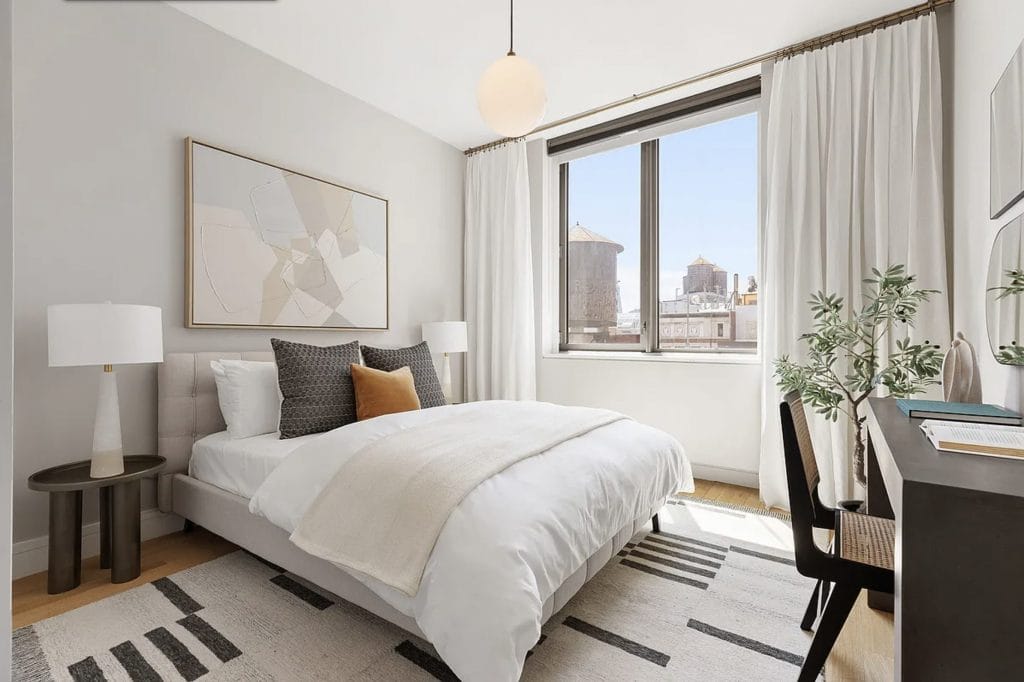
Just like homes worldwide, Scandinavian decor style uses nightstands to support the accessories. Common designs feature a simple box with one open shelf or a flat circular top on slim legs, sitting just below the mattress line. You don’t have to buy the full set, but try to match the table’s finish to the bed frame or floor. When drawers appear, they slide without hardware and stop shallow.
Pro Tip: Choose a table that lines up with the seated elbow. That keeps the movement short and the tabletop clear.
Our Picks
12. Layered Bedding for an Ultimate Hygge Vibe
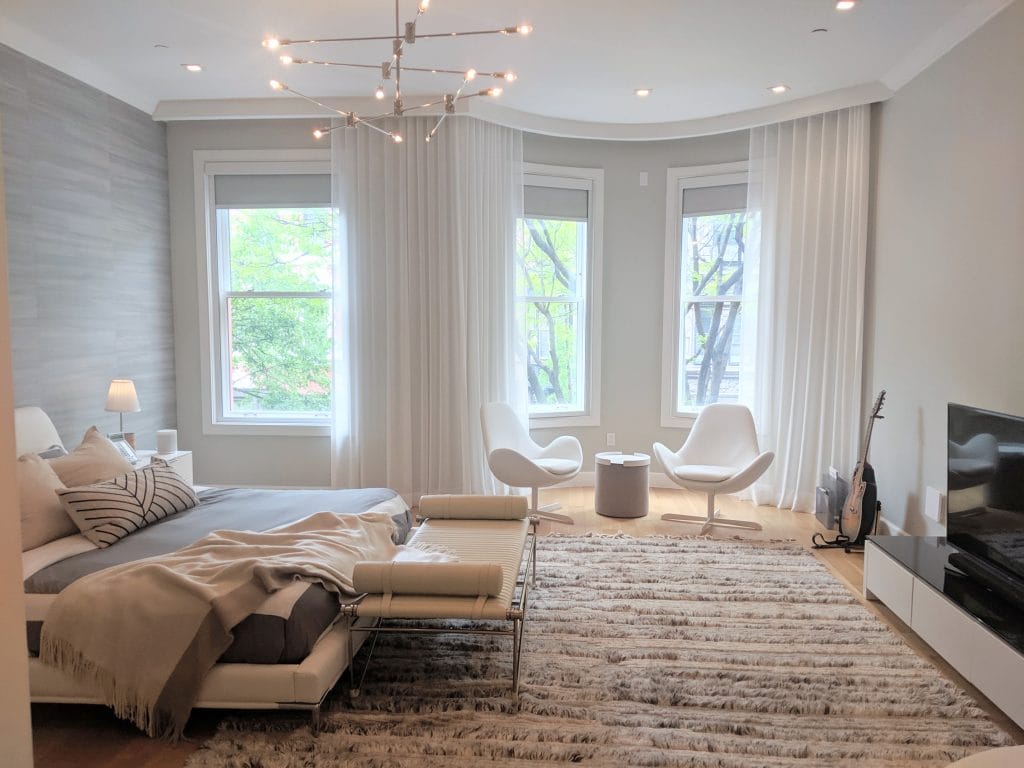
The bed in a Scandinavian room takes on more presence when the bedding adds weight through color or weave. This is one of the few opportunities to make a statement with strong accents, so consider deep blue, rust, or green duvet covers or heavy linen spreads. The contrast works because the frame and floor remain pale, and the rest of the room leaves space for subtle dynamics. Texture also matters—opt for thick linen with visible creases, or a wool throw folded along the foot.
Pro Tip: When the bedding carries color, let it be the only strong tone in the room.
Our Picks
Streamlined Scandinavian Bathroom
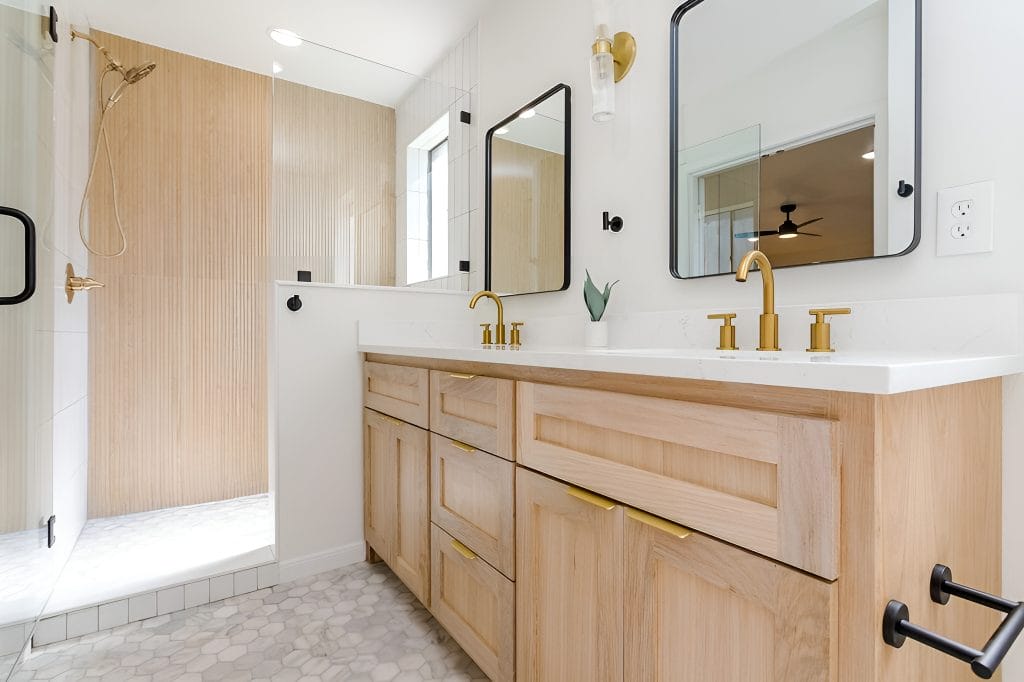
A Scandinavian bathroom holds few objects, placed with the same care as fixtures. The aesthetic follows function, and surfaces respond to heat and moisture. Walls take tile or sealed plaster in pale tones, while floors often carry matte porcelain laid in large units.
13. Multifunctional Wooden Stool or Bench
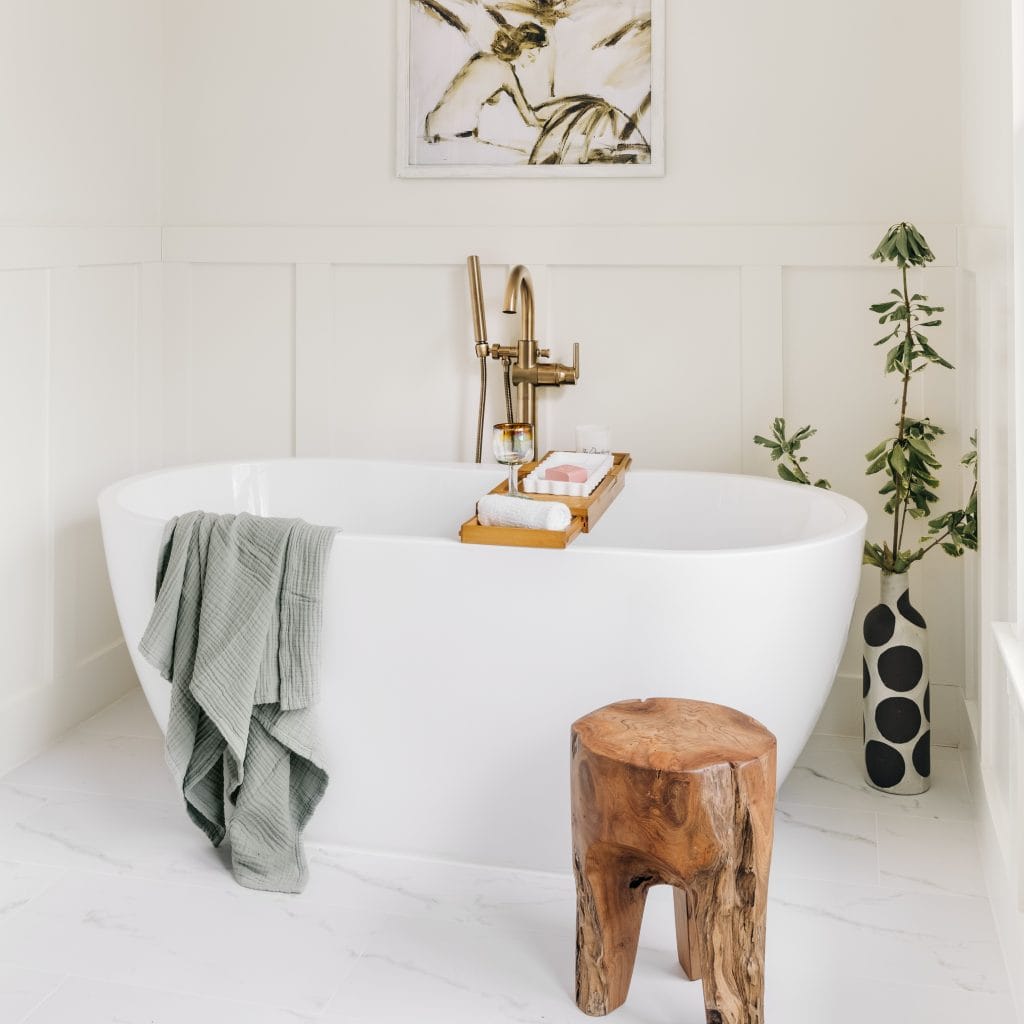
Scandinavian bathroom interiors often feature a wooden stool or a bench. Place it somewhere between the basin and the shower wall, where it won’t get wet but still remain close to hand. Sealed oak or birch works best—slatted if you expect to leave damp fabric on it, solid if you prefer it to carry visual weight. The space underneath can accommodate a few woven baskets for storage; just avoid benches with built-in compartments unless the room needs enclosed mass.
Pro Tip: Follow the scale of nearby fixtures to promote balance of the layout.
Our Picks
14. A Tray That Keeps the Sink in Order
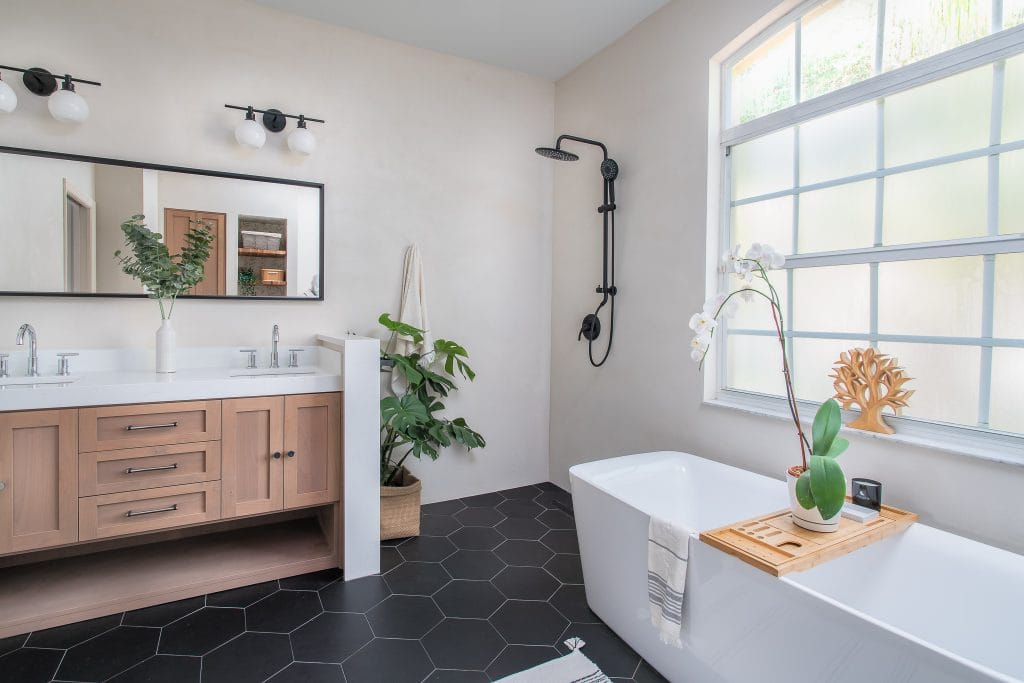
Keep accessories and small items visible but arranged, so that they become a part of the decor. Pick complementary materials and organize the pieces on low trays. In general, stoneware works well if the wall carries tile or plaster; lacquered wood fits better with sealed oak shelving. Three objects create the most stable composition. Keep the size close to the width of the faucet base or the mirror above—too wide and it pulls attention, too small and it floats.
Pro Tip: Let the shapes vary, but keep the spacing consistent.
Our Picks
15. Minimalist Wall Mirror And Racks With Clean Edge
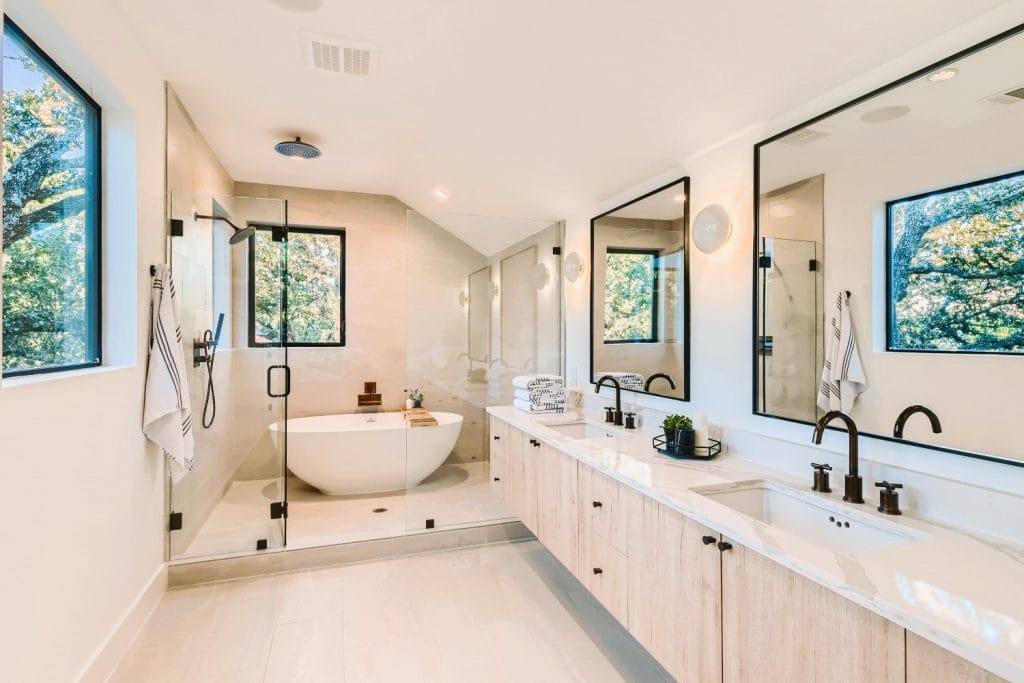
Wall mirrors in Scandinavian bathroom decor tend to follow the width of the basin or vanity below. Frameless designs work best when the wall surface already carries texture or tone—think sealed plaster, matte tile, or treated wood—while a thin wood frame helps when the room needs a line. If you opt for black metal or brushed steel, let the same material and finish flow between the mirror, the racks and hardware, and the fixture finish.
Pro Tip: When shelf and mirror align in width, the whole unit reads as one element.
Our Picks
Entryway Decor in Scandinavian Home Style
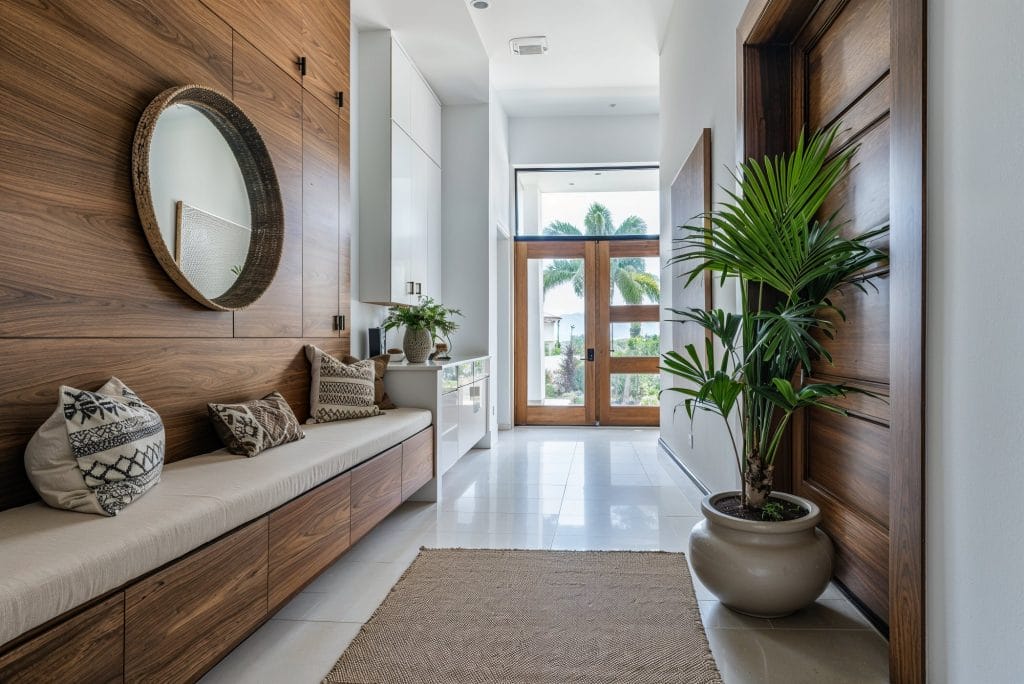
Scandinavian entryways are designed to manage transitions. Even when small, the entry is treated as a working part of the layout, sharing the same, curated yet functional aesthetic.
16. Functional Yet Compact Bench
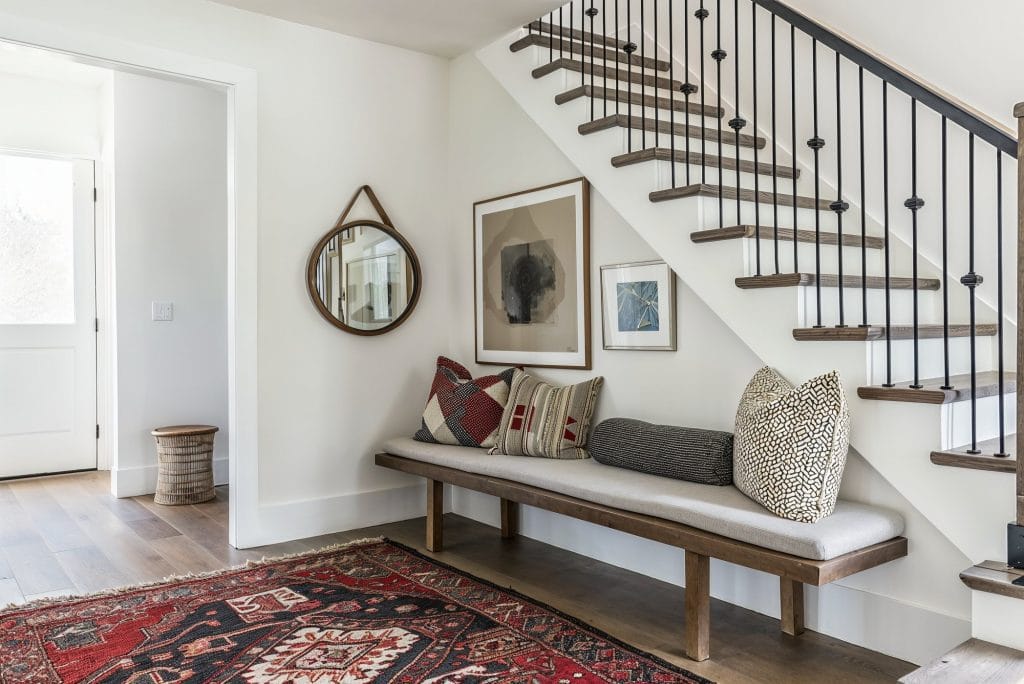
Most Scandinavian entryways begin with a bench, but not every bench settles the space. Most designs sit low, in pale wood with squared corners and exposed joinery. Their finish matches the door or the flooring that runs past. Placement is usually offset from the center, leaving space at one end for a plant or a basket. That asymmetry lets the room hold weight but remain airy.
Pro Tip: A bench that reads as part of the wall gives the rest of the objects something to work from.
Our Picks
17. A Console That Frames the Entry Wall
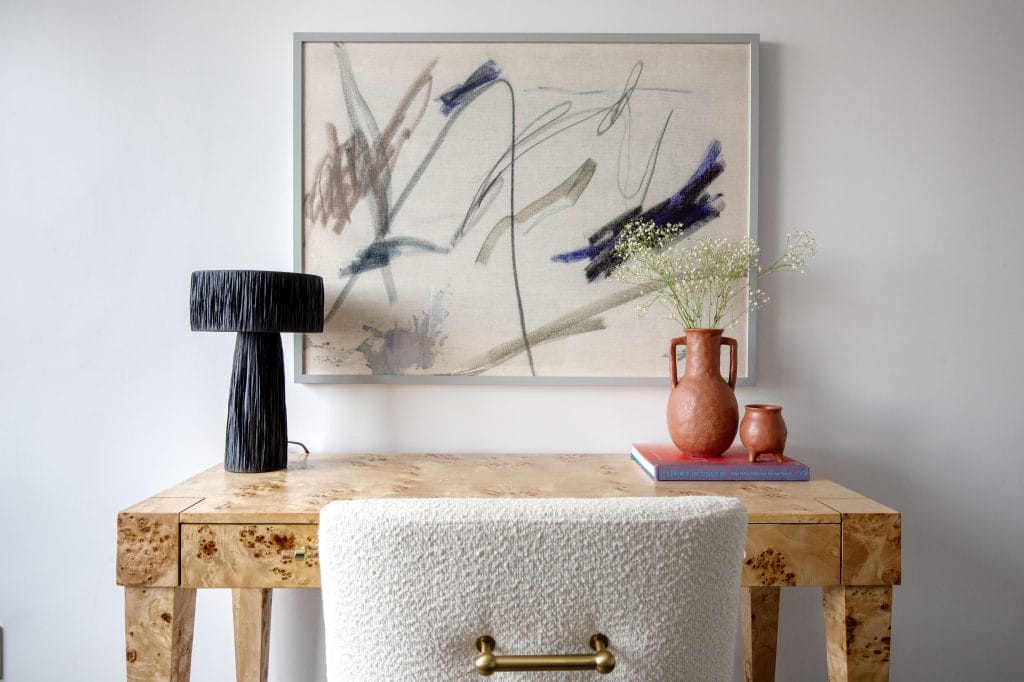
Console tables are typically narrow, with open bases. Complement them with a stoneware bowl or a tray, good for keeping small knick-knacks at bay. Consider also a table lamp in matte metal, and a framed print or mirror above to give the wall presence. Finishes should echo nearby elements—door hardware, floor tone, or the frame of whatever sits above.
Pro Tip: A console that holds its edge in clear view can take on more variation in Scandinavian decor objects.
Our Picks
18. Small-Scale Scandinavian Home Decor
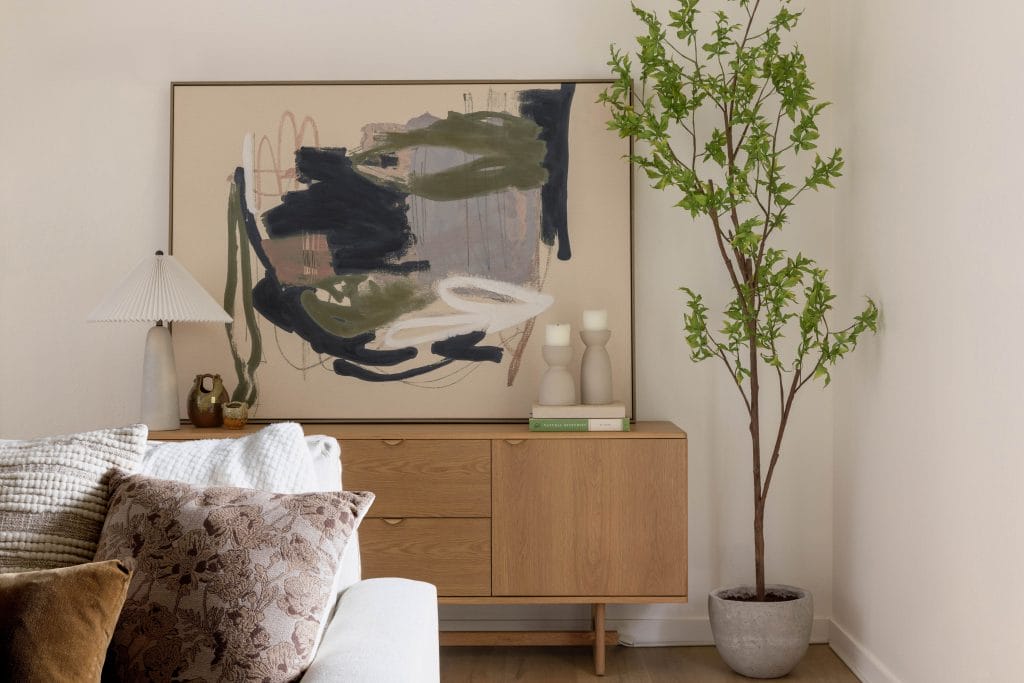
Scandinavian entryways leave most of the wall clear, but a small group of objects placed with care can register as part of the layout. One print or textile panel in a narrow frame sits well above the bench or console. A single floating shelf may hold a potted plant or a small branch in a jar. Materials should follow the same register as the furniture, so keep them quiet under light.
Pro Tip: Choose pieces that shift scale across the group; for instance, one flat, one dimensional, one with trace of use. That variation holds attention even when monochromatic.
Our Picks
Scandinavian Nursery Decor & Kids’ Rooms
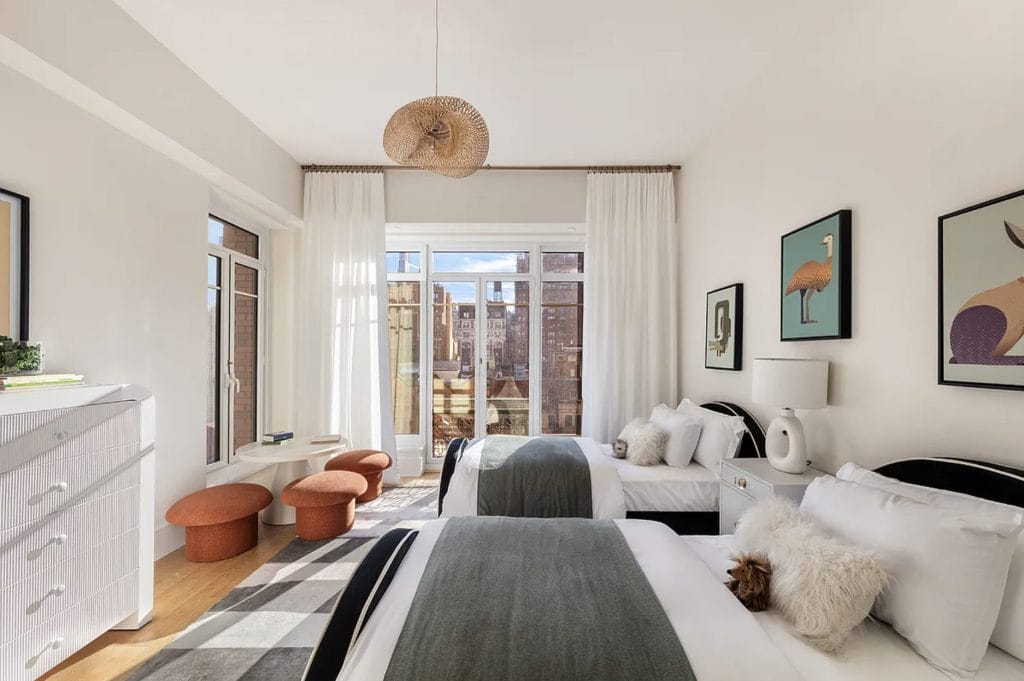
Along with abundant wood, these spaces carry more colors than other rooms. Forms are softer, and objects are chosen for touch as much as for use. Plus, you get the opportunity to introduce vibrancy through vivid gallery wall layouts.
19. Nature-Driven Storage Within Reach
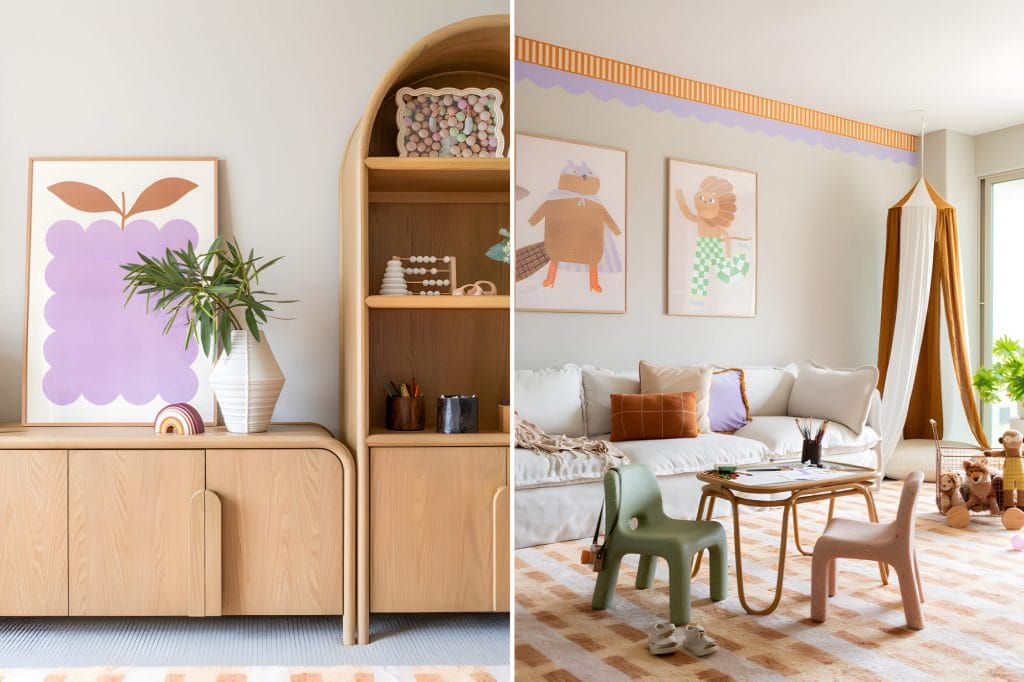
Baskets, low shelving, and lidded bins carry most of the storage in Scandi-style nurseries and kids’ rooms. If the space is limited, mount a narrow ledge above the crib or changing table for framed prints or soft figures that rotate as the child grows. When choosing floor shelving, keep in mind that most items should sit within reach. The same applies to peg rails or hook boards, if you’re using any.
Pro Tip: Try to match the storage finishes to the floor tone or the table legs, to quiet a room full of colorful items.
Our Picks
20. A Crib That Sets the Room’s Line
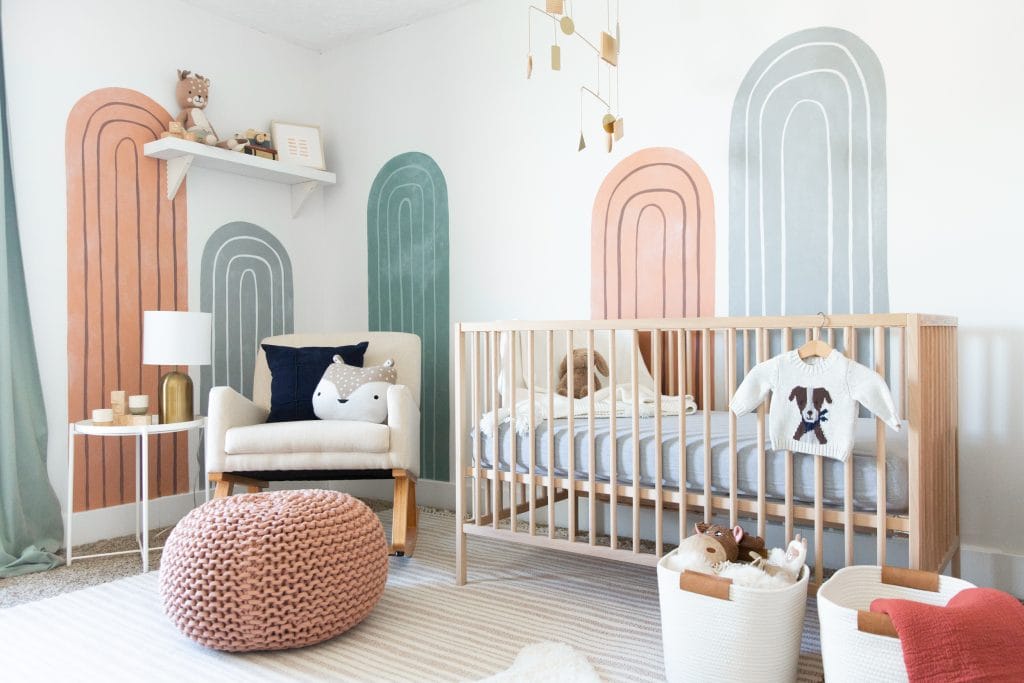
Scandinavian nursery decor can be neutral, but it also welcomes some pastels. The wooden cribs sit low, with vertical rails and no ornament. Mobiles often hang in corners, made of folded paper or wood, with matte finishes that don’t catch light too sharply. Shapes are simple, in quiet contrast to the crib or wall behind them.
Pro Tip: Connect the crib and seating in tone or texture, so that the layout holds even as decor rotates.
Our Picks
21. Strong Color Can Sit Inside the Kids’ Room
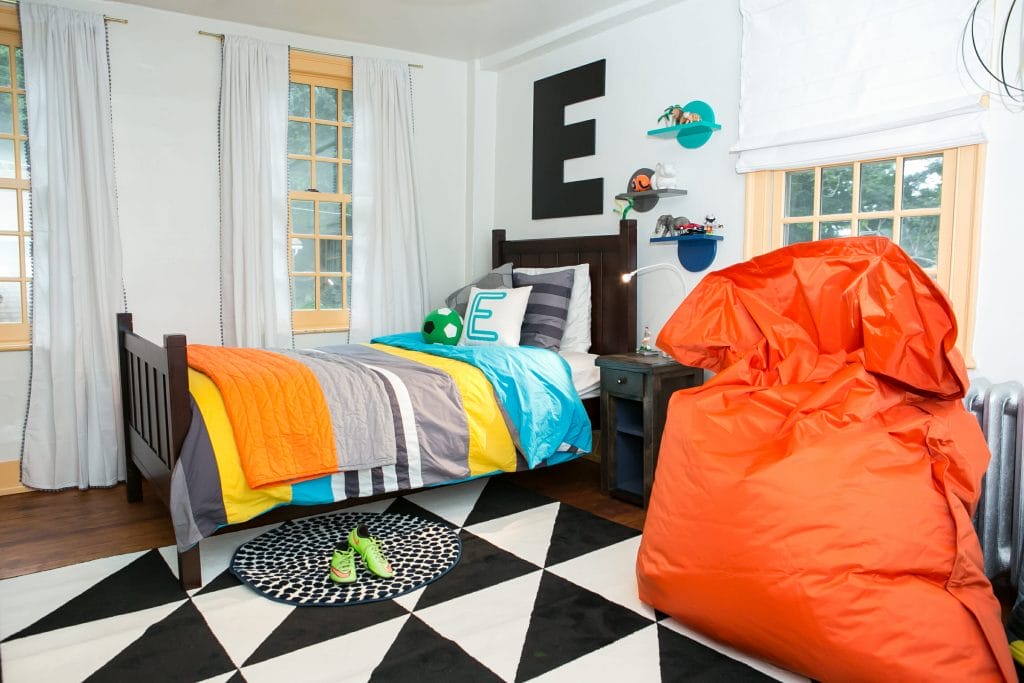
Nordic kids’ rooms often begin with a pale envelope filled with light wood. But children need color too, so it enters through objects that already belong—decor, bedding, toys, accessories. Instead of layering full palettes, pick two or three tones and repeat them across soft pieces. That overlap helps the room design stay consistent.
Pro Tip: If the mobile includes flat elements, hang it where morning light can pass across it and play with shadows.
Our Picks
Scandinavian Home Office Decor
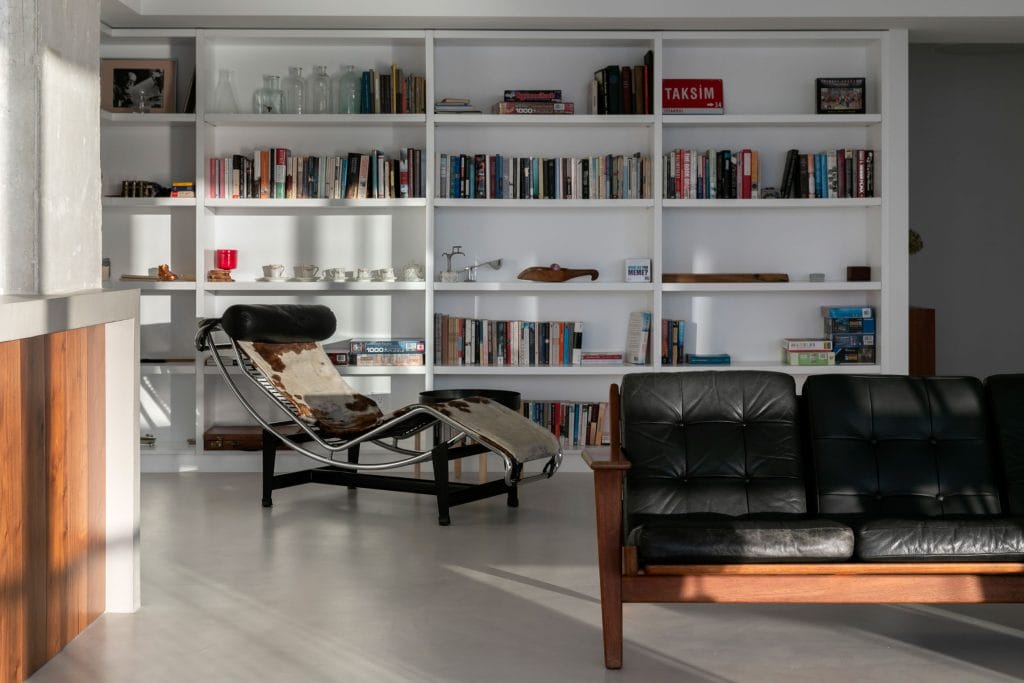
Modern Scandinavian home office decor can stand alone, but it also meshes well with other interior design styles. In addition, some of the most famous Scandinavian chairs in the world are a perfect addition to those spaces, a match made in heaven for sleek, tall shelves full of books.
22. A Desk That Sits in the Window’s Path
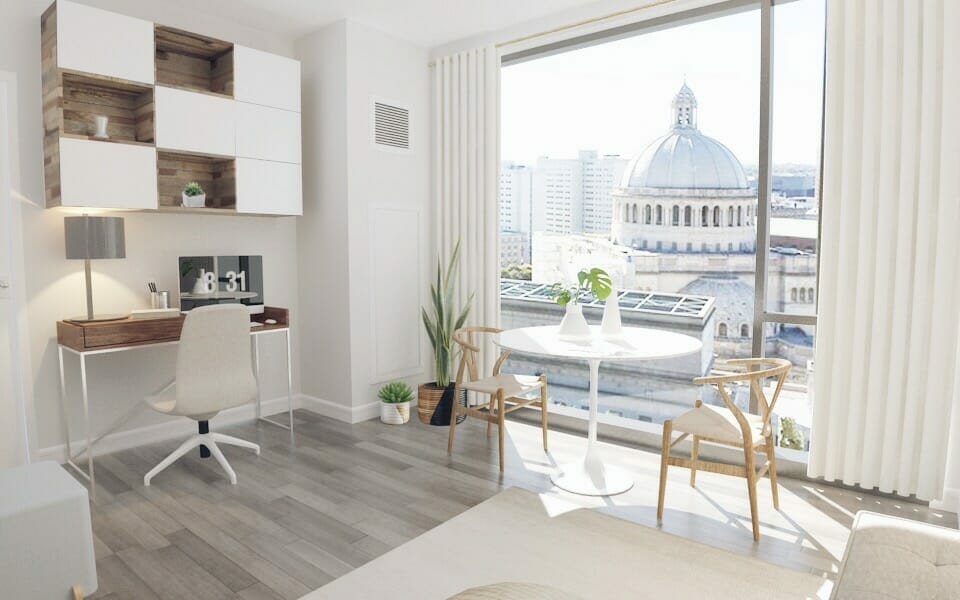
Scandinavian home offices often place the desk close to the window, less for the view and more for consistent light across the work surface. Workspaces typically follow a rectangular form with straight legs. Decor is present, but the desk’s top itself often stays clear except for one or two items in use and a task lamp.
Pro Tip: Just like the rest of a Scandinavian home, a Scandi home office decor needs a pretty little pot plant or two to finish the look.
Our Picks
23. Clean-Cut Surfaces That Break the Wall
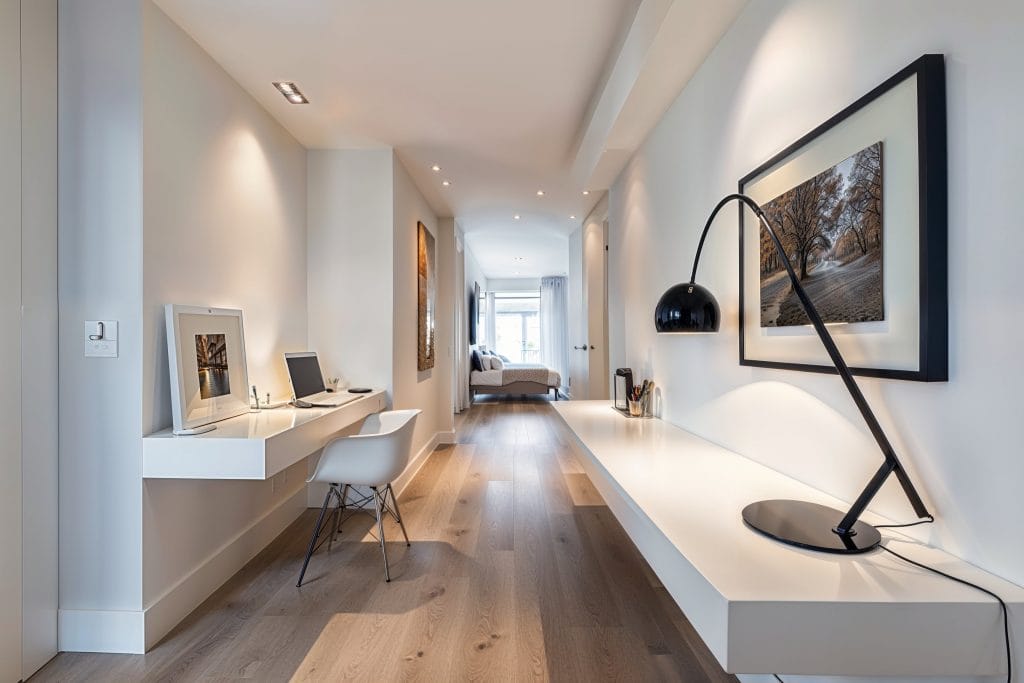
Wall-mounted desks or console-length work surfaces appear often in Scandinavian apartments. If you choose this option for your Scandi office makeover, keep the decor minimal but weighted. It could be one framed print leaned against the wall, and/or one stone or ceramic object with a dull finish. Desk lamps clipped to the shelf or mounted beside it work better than standing ones; look for powder-coated metal in black, forest, or rust.
Pro Tip: These surfaces often shift between work and storage, so objects need to sit still and hold their place even when the desk is cleared.
Our Picks
24. Along the Shelf, Across the Wall
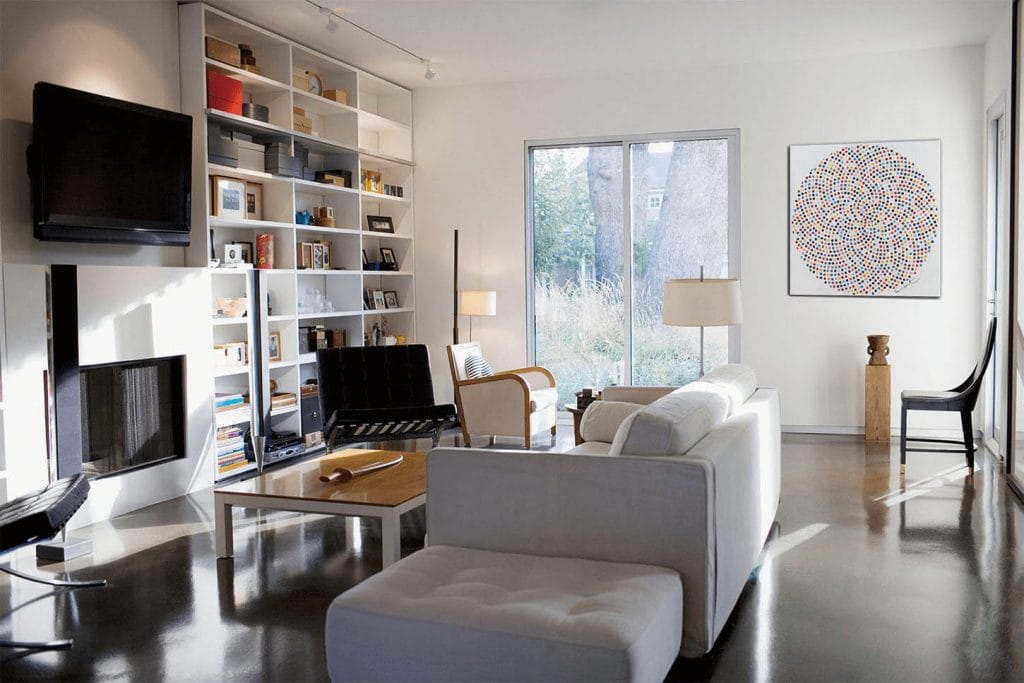
Sleek, tall shelving is a recognizable staple of Scandinavian design and an element often found in home offices. Opt for white or pale wood, set shallow enough to keep the profile from closing off the wall. Then fill no more than two-thirds of the total volume with books in small groups. Use the rest to display ceramics, closed boxes, or framed paper objects.
Pro Tip: Blend in a few framed prints or black-and-white photographs.
Our Picks
Ready to create your Nordic-inspired interior?
Our team of talented designers can help create your dream space. So, schedule a Free Interior Design Consultation for professional interior design assistance today!

